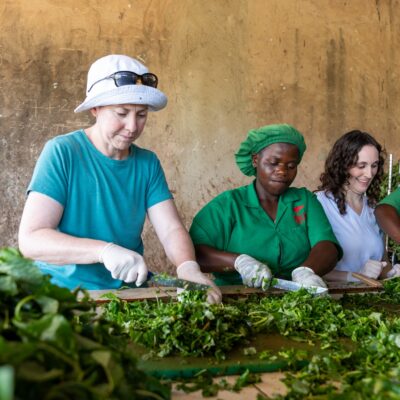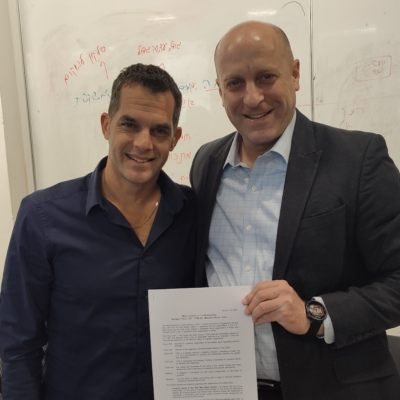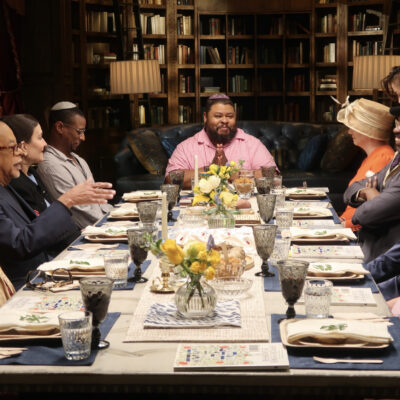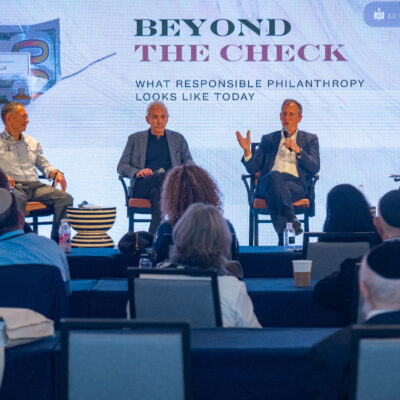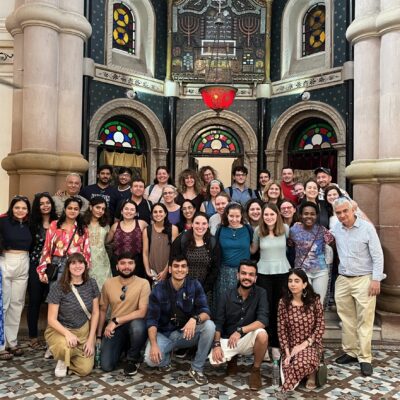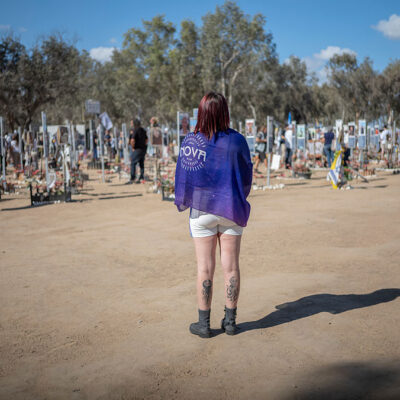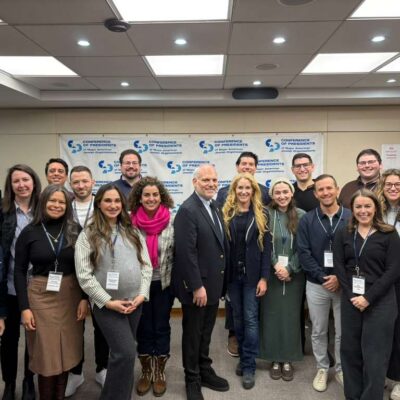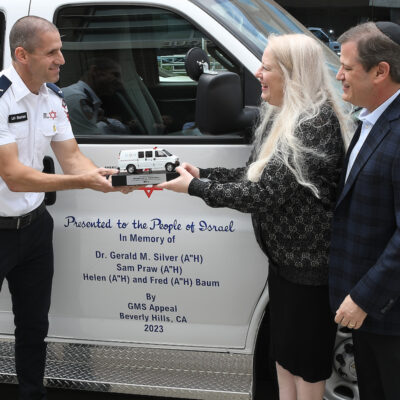HOME FRONTS
As war in Gaza drags on, HaOgen looks to ‘anchor’ families of reservists
National organization provides support to more than 10,000 families, preparing for the long haul as military expects troops to be needed for a year

Courtesy/HaOgen
A family holds up a meal that was donated by 'HaOgen LeMishpachot HaMiluim' during the Israel-Hamas war.
The tune will be familiar to fans of classic Israeli music: the rapid, breathy tempo of an accordion meant to simulate the high-adrenaline pulse of close combat.
But instead of the tale of courage and sacrifice that normally accompanies the music, the tale of the Paratroopers Brigade’s famed Six-Day War battle for Jerusalem’s Ammunition Hill, the lyrics describe a different and admittedly lesser tale of courage and sacrifice, that of the wives of Israel’s reservists, some of whom have been without their husbands and co-parents since Oct. 7.
“I’m sending an email with one hand, and in the other, I’ve got a frying pan,” one frantic, wild-haired woman sings. “And I’m already out of Clonex,” she adds, referring to a common anti-anxiety medication.
This is the latest offering of “Eretz Nehederet,” an Israeli analog of “Saturday Night Live,” which throughout the war has used humor to address serious issues in Israeli society. The Ammunition Hill parody — dubbed “The Wives of Tzav Shemoneh (Order 8),” referring to the official term for the military orders issued to call up reservists — reflects the growing frustration by the spouses of reservists, as well as the reservists themselves, as the war in Gaza drags on with no clear end date in sight.
“We are getting close to the moment in which the reservists will be torn between family and country,” one commander of a reservist brigade told the Ynet news site last week.
To offer some form of assistance to these reservists’ spouses, early in the war, Rachel Azaria, a former deputy mayor of Jerusalem and one-time Knesset member, along with social entrepreneur and activist Yael Yechieli and high-tech executive Racheli Shuraty, created HaOgen LeMishpachot HaMiluim (The Anchor for the Families of Reservists), a nonprofit that offers assistance to the spouses — and even ex-spouses — of reservists. (Not to be confused with Ogen, the nonprofit lender.)
“We help with babysitting or even just providing an extra set of hands while the mother is still home, bringing cooked food, transporting kids, help around the house, taking the dog for a walk, moving apartments,” Azaria told eJewishPhilanthropy.
The Israel Defense Forces is built on a reservist system, with the majority of its total potential fighting force being made up of reserve forces. This model was developed at a time when Israel’s economy and society were profoundly different, where — among other things — single-income households were far more common and fathers were less expected to play an active role in childcare.
This is no longer the case, and so for more than 100 days in some cases, mostly (but not only) women have been left to shoulder the burden of childcare alone, or at least without their regular partners, while still being expected to function at work as normal.
Azaria cited one woman, a doctor, who gets a volunteer from HaOgen to come to her house twice a week at 6 a.m. to get her kids up and ready for school so that she can get to her hospital for her two morning shifts.
“Without that, she can’t work,” Azaria said.
The nonprofit provides help to more than 10,000 families of reservists across the country — not one-off assistance but regular support, Azaria stressed — through a network of thousands of volunteers.
“We don’t ask, ‘Do you want help?’ We say, ‘We want to help you. Here’s what we can do,’” Azaria said. “This is a population — families of reservists — that’s not used to asking for help.”
The idea for HaOgen was born during the 2014 Gaza war, Operation Protective Edge, when Azaria was deputy mayor of Jerusalem and helped develop and run a similar initiative for the spouses of reservists in the capital.
This time, however, Azaria, Yechieli and Shuraty decided to offer the assistance nationally. HaOgen operates in 250 cities and towns, each of which has a coordinator (or several in big cities). These are then divided into seven regions, each of which has its own coordinator.
The people who volunteer with HaOgen tend to come from three main groups, Azaria said: social activists, tech workers who want to provide technical assistance and former IDF personnel.
Azaria, who shared the “Eretz Nehederet” video on her Facebook page, noted that the parody focused primarily on the logistical difficulties of single parenthood and left out much of the emotional stress and deep fears of having a spouse away at war.
Azaria said she has her own visceral memories of her husband being called up through a tzav shemoneh for immediate reserve duty in the 2002 Operation Defensive Shield during the Second Initifada.
“Tzav shemoneh still gives me chills,” she said. “It’s a kiss to you, a kiss to the kids and he leaves.”
Recently, HaOgen partnered with another nonprofit, Makshivim (Listening), to provide mental health support to the families of reservists. Over 600 people have signed up for group sessions with mental health professionals through HaOgen.
One aspect of the Eretz Nehederet parody that Azaria said particularly and increasingly reflected reality was one woman on the phone demanding, “Get me the battalion commander!” While having to hear the complaints of a soldier’s family may seem like a minor inconvenience given the circumstances, these types of calls are increasing and can have a significant impact on morale and can distract from the war effort, Azaria said.
“Battalion commanders are contacting us, and saying, “The biggest problem we are having is the families,’” Azaria said.
According to Azaria, the military has increasingly been reaching out to HaOgen for help.
“The military is realizing that this is a problem, and that they don’t know how to do this. We know how to do this custom-tailored assistance,” she said.
Though many cities and towns across the country have their own initiatives to help reservists’ families, HaOgen is the only national organization dedicated to this area.
In addition to the military, the organization also works closely with the Education Ministry, youth groups and with the retired members of the Teachers’ Union to provide volunteers. The insurance for these volunteers is covered by the Welfare Ministry.
Until recently, the nonprofit has worked exclusively through its network of volunteers, but as it has grown and increasingly understood that this is a long-haul effort, it has hired a small number of staff members — a project manager and volunteer coordinator — and started paying for office space and for different technological services to help keep things organized.
But Azaria said that even the organization’s basic goal of doing “something significant” for the families of reservists each month quickly became expensive at the scale at which they are operating.
“Sending everyone pizza [in October] cost hundreds of thousands of shekels,” she said.
At first, HaOgen refrained from major fundraising efforts, believing that other groups — survivors, evacuees, the reservists themselves — needed the potential donations more. “At first, it wasn’t pleasant to raise money,” Azaria said. “But [this issue] became more significant over time,” she said.
The group has already received support from the Jewish Federations of North America ($210,000 so far, according to JFNA’s latest allocation report) and UJA-Federation of New York, as well as from a number of other foundations and private donors. HaOgen has also partnered with the American Zionist Movement, which is hosting a crowdfunding campaign for the nonprofit on its website.
The nonprofit’s leaders initially had a mindset that its services would be needed “one more month, then one more month,” but after a recent meeting with the military they understood that some reservists would be deployed — with occasional breaks — for at least a year.
“We’ve had to change from a sprint to a marathon,” Azaria said.

 Add EJP on Google
Add EJP on Google





